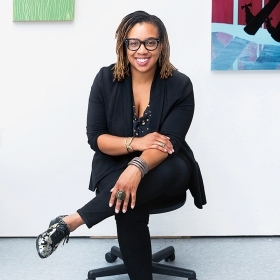Photo by Richard Howard
When Katie Hall ’84 stepped onto the Wellesley campus in 1980, she planned to pursue political science. “I had aspirations to be president of the United States,” she says. “I didn’t go into Wellesley thinking science.”
She signed up for Physics 101 to get her science requirement out of the way, but by the end of the semester, decided she wanted to major in physics. “I absolutely loved it,” Hall says. “Working in the lab and learning the physical concepts really captured my attention. That cycle of theory and experiment—to this day, I find it thrilling.”
It’s a passion she brings to the classroom now that she’s back at Wellesley as a visiting lecturer in physics. Hall spent decades working for some of the country’s top research labs. She holds 98 patents, with more pending. She brings an expertise in fiber-optic communication—a way to transport information by sending pulses of light through an optical fiber—to her introductory physics classes. She also applies her background in athletics. At Wellesley, she played varsity volleyball, basketball, and lacrosse.
“To the extent you can make the classroom feel like a team, those are always the best classes,” Hall says. She regularly uses demonstrations—popular ones show how electric and magnetic forces work—that spark students to ask questions and form alternate hypotheses. “Exploring brings everyone together,” she says.
After Wellesley, she honed her specialty at AT&T Bell Laboratories in New Jersey, and then at Lincoln Laboratory and MIT, where she earned her doctorate in electrical engineering and computer science.
Hall developed laser transmitters and other optical devices to help speed up optical fiber communication systems and the internet. Later, she got into wireless technology, designing wireless power solutions. The bulk of her patents focus on wireless technology. Some of her inventions, like wireless charging systems for electric vehicles, will be on the market as early as next year. Others, related to powering implanted medical devices and transferring power from solar panels, are still being developed.
Then came the 2016 presidential election. “The outcome was a shock to my system,” Hall says. Suddenly, that old feeling from her early days at Wellesley bubbled to the surface. She wanted to help make the world a better place. But she still wasn’t sure that politics was the place to do it.
Hall’s husband suggested teaching. When she looked at the Wellesley website, she saw an opening for a visiting physics professor. “It was meant to be,” says Hall. “It’s felt like coming home.”






We ask that those who engage in Wellesley magazine's online community act with honesty, integrity, and respect. (Remember the honor code, alums?) We reserve the right to remove comments by impersonators or comments that are not civil and relevant to the subject at hand. By posting here, you are permitting Wellesley magazine to edit and republish your comment in all media. Please remember that all posts are public.